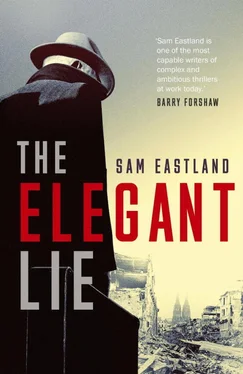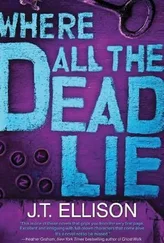Painted in white letters on an iron girder, which was all that remained of a shop, were the words, ‘We want action. Words are not enough.’ Across from that, a theatre had opened showing The Best Years of Our Lives, with Fredric March and Myrna Loy. Although the movie was already a couple of years out of date, it was still the only business open on that street.
Carter lingered there, studying the doorways and the alleys and the rubble-filled dead ends where he might be cornered if he ever had to run. Satisfied at last, he pedalled along the military ring road on the southern edge of town, wooden brake pads smoking as he raced between the luminous green of neatly tended sports fields and the jagged shapes of empty, bombed-out buildings until he arrived at last at the gates of Dasch’s compound.
Dasch and Ritter were waiting. Dasch was tallying receipts and Ritter lounged in a chair, reading an old copy of the US Army magazine Stars and Stripes.
‘Do you have the money ready?’ asked Carter. ‘The meeting is in an hour and I have to get back across the city on that bicycle.’
Dasch lifted a grey canvas satchel onto his desk. ‘All here,’ he said, patting the lumpy contents of the bag.
Carter stepped forward to take it.
But Dasch’s hand remained upon the satchel. ‘I was thinking,’ he said.
Carter stopped in his tracks. ‘Thinking what?’
‘I just wondered if it might make sense for you to have an escort. This is an awful lot of money, after all.’
‘Are you worried about him stealing it or about me stealing it?’ asked Carter.
‘I am worried about it getting stolen,’ replied Dasch. ‘It won’t make much difference who has taken the money if it’s gone. For this reason, Ritter has persuaded me that I should allow him to accompany you.’
‘And he’s going to drive me there in the Tatra?’
‘Of course.’ Ritter tossed aside the magazine. ‘Why wouldn’t I?’
‘It’ll stand out too much,’ Carter told him.
Ritter glanced across at Dasch. ‘But that’s the car I drive!’ he protested.
‘Carter is right,’ said Dasch. ‘You can take the Wanderer instead.’
The Wanderer was a small, lopsided sedan whose rear springs had almost given way, so that the back of the chassis appeared to be resting on the wheels. Carter had seen the old car parked behind the garage, a silhouette of oil gradually seeping out from beneath its leaking engine. He hadn’t even thought it was still running.
‘You can’t be serious!’ Ritter growled indignantly. ‘It’s humiliating even to get behind the wheel of that thing.’
‘You can swallow your pride for a few hours,’ said Dasch. He removed his hand from the bag and Carter picked it off the desk, surprised at its weight.
Ritter soon appeared from behind the garage, hunched inside the Wanderer and revving the engine savagely since it seemed on the verge of cutting out. Clouds of bluish smoke belched out of the rusty tailpipe. ‘Hurry up and climb in!’ he shouted at Carter. ‘Otherwise we won’t get there at all.’
Soon they were rattling along towards the meeting point. The passenger-side window was missing and wind shrilled past the poorly fitting piece of plywood that had been put there in its place.
For a while, each man kept to himself. Then suddenly Ritter began asking questions, in the same relentless fashion he had used when they first met.
How do you know this man? Where did you first meet him? Is he known to be a criminal? Did you approach him or was it the other way around? Are there others like him or is he the only one you can deal with for black market goods? Does he know where you live? Does he know you were in prison? Does he know why? Do you trust him? Does he trust you?
Once more Carter endured the barrage, the answers, true or false, forming in his mind before Ritter had even finished his questions. Finally, though, he threw up his hands and said, ‘Enough!’
‘That isn’t for you to decide.’
‘In case you had forgotten,’ said Carter, ‘you and I are driving to this rendezvous with a bag of Dasch’s money and we’re coming home with a truckload of contraband. So whether you trust me or not, we’re headed in the same direction, whatever that turns out to be.’
‘There is some truth to that,’ admitted Ritter.
‘I asked you once before if you were a cop,’ said Carter. ‘You dodged the question then. Are you going to dodge it now as well?’
Ritter considered this for a moment. ‘I suppose it wouldn’t hurt to tell you, just to pass the time. I was an interrogator during the war. I operated mostly on the Eastern Front, questioning high-ranking enemy officers.’
‘You speak Russian?’
‘I do,’ he replied. ‘My father was a businessman who often travelled to the Soviet Union. He sold parts for steam turbines that were used at hydroelectric plants. He was convinced that the future of Germany lay not in our alliances with the west, but to the east, in Russia and beyond. Because of that, he insisted that I learned Russian. He refused to believe that our two countries would end up in a war and when the Molotov–Ribbentrop Pact was signed in August 1939, guaranteeing peace between Russia and Germany for the next ten years, he felt sure that his instincts had been correct. And then, when Germany disregarded the pact and invaded Russia in 1941, it broke my father’s heart. And for myself, instead of using my language skills to sell steam turbines the way my father had imagined, I ended up firing questions at Soviet commissars, majors, colonels and even a general or two.’
‘Only officers?’
Ritter shrugged. ‘They were the only ones who knew anything of value. In the opinion of the German High Command, the average Russian soldier could barely sign his own name, let alone tell you where his division was about to be deployed. It wasn’t true, but the High Command were very fixed in their ideas about what the Russians could and couldn’t do. That was what cost us the war, something they might have been able to avoid if they had only listened to me.’
‘What do you mean?’ asked Carter.
‘In June 1943,’ explained Ritter, ‘a Russian transport plane strayed over our lines during a snowstorm and crash landed. There were ten people on board, of whom three survived. They were all officers attached to the headquarters of General Zhukov’s 14th Army and I was given the task of interrogating them. I took my time. No violence. The trouble with pain is that it will make a person say anything, no matter how far-fetched, just to stop the process, even if only for a while, and that is of no use at all. The shock of finding out that one is not going to be tortured is often more effective than any infliction of pain. So they began to talk, although not about anything they thought I could use, such as Russian troop movements or rates of desertion or the failure of tank engines or anything like that.’
‘Then what did you learn?’ asked Carter.
‘What those men told me was something I already knew, which was that Germany was planning an attack. They threw it in my face, to show how much they knew about us and how little we would learn about them. And I allowed them to believe they had succeeded. I showed surprise. Even astonishment. And this made them even more boastful, adding details about the attack designed to humiliate our delusions of conquest. Unknown to them, however, what they had actually given up was far more valuable than anything they could have told me about their own army. You see, this was not just any attack we had been planning. This was to be the greatest assault of armour in the history of mankind, punching a hole through the centre of the Russian forces, not far from the city of Kursk. If it succeeded, it would snap the entire Red Army in two, draining them of their resources in a way from which even they would be unable to recover. It would finish the war in the east, allowing us to concentrate our forces on the impending invasion of the Anglo-Americans in the west. In short, it would have decided the war in our favour. I informed the High Command of my findings and advised that the attack should be called off, but they told me it was too late. Hitler had already made up his mind. He believed that, even if the Russians did know what we had planned, they would be unable to stop us. He also believed that secrecy had been maintained, so it was, in fact, impossible that these Russian officers would have known. They told me I was being duped, and that the Soviet officers were saying anything that came into their heads, just to lead me away from acquiring any real information.’
Читать дальше











